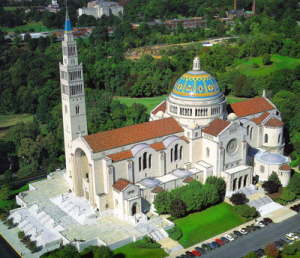
 HIS YEAR, the Solemnity of the Immaculate Conception of the Blessed Virgin Mary falls on Monday, December 8 (yes, it’s always on December 8, but last year it was on Monday, December 9 in the Ordinary Form. We’ll come back to that). One question that we get pretty often in the Office of Worship is, “is it a Holy Day of Obligation this year?”
HIS YEAR, the Solemnity of the Immaculate Conception of the Blessed Virgin Mary falls on Monday, December 8 (yes, it’s always on December 8, but last year it was on Monday, December 9 in the Ordinary Form. We’ll come back to that). One question that we get pretty often in the Office of Worship is, “is it a Holy Day of Obligation this year?”
The confusion is somewhat understandable. When most other days of obligation in the United States fall on a Saturday or a Monday, the obligation is lifted. The faithful are encouraged to attend Mass on these days, but it is not obligatory.
Immaculate Conception, like Christmas, is a special case. This solemnity is the patronal feast of the United States of America, and so has an even greater importance in this country. Even when December 8 falls on a Saturday or a Monday, it is a Holy Day of Obligation. One is required to attend Mass on that day.
The next question that follows fairly often is whether or not someone could attend Mass on the evening of Sunday, December 7, and have it fulfill the obligation to attend on Immaculate Conception. Let’s set aside the question of “double dipping” your obligation (something that canonists disagree on, and I’m no canonist), and explain the basic question. According to Canon Law, your obligation to attend Mass is fulfilled “by assistance at a Mass which is celebrated anywhere in a Catholic rite either on the holy day or on the evening of the preceding day. (Canon 1248.1)” Let’s break that apart a little bit, because there are a few points to be made here.
1. Your obligation can be fulfilled by any Catholic rite. You can attend a Maronite Catholic liturgy, an Anglican Ordinariate liturgy, or any other Catholic liturgy which is in communion with the Church.
2. Mass in the evening of the preceding day fulfills your obligation, just like attending a Mass of anticipation on a Saturday evening fulfills your Sunday obligation.
3. Note that the obligation is tied to the day, not to the particular feast. This may seem legalistic, but it is actually better for pastoral need. For example, last year’s Immaculate Conception was “bumped” to Monday, December 9, because the feast fell on the Second Sunday of Advent. That Sunday ranks higher in precedence to the Immaculate Conception, so the feast could not be celebrated that day. However, because the obligation is tied to the day (December 8), the transferred feast is not obligatory. What readings are heard, or what Mass is said, is not relevant to whether or not the faithful’s obligation has been fulfilled.
Putting all of this information together, we can say that one can fulfill his or her obligation to attend Mass on December 8 of this year by attending a Mass on the evening of Sunday, December 7. Since December 7 is the Second Sunday of Advent, however, the Mass celebrated on that day must be the Advent Sunday, not the Immaculate Conception. However, since obligation is tied to the day and not to the Mass celebrated, even this situation fulfills obligation. So, sidestepping the question of “double dipping” (let’s assume you attended Mass this Sunday morning, as well), the evening Mass “counts.”
Note that in cases where you genuinely are unable to make it to Mass because of uncontrollable circumstances that cannot be overcome, your obligation is lifted anyway.
Also, even if “double dipping” is legal, you might not be doing your soul any favors by aiming for the Minimum Daily Requirement of your faith. So get thee to Mass.
